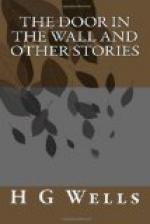He seemed to hesitate. Then, almost inaudibly, he answered, “no.”
“You mean?”
“I couldn’t get to her. She was there on the other side of the temple— And then—”
“Yes,” I insisted. “Yes?”
“Nightmares,” he cried; “nightmares indeed! My God! Great birds that fought and tore.”
THE CONE
The night was hot and overcast, the sky red, rimmed with the lingering sunset of mid-summer. They sat at the open window, trying to fancy the air was fresher there. The trees and shrubs of the garden stood stiff and dark; beyond in the roadway a gas-lamp burnt, bright orange against the hazy blue of the evening. Farther were the three lights of the railway signal against the lowering sky. The man and woman spoke to one another in low tones.
“He does not suspect?” said the man, a little nervously.
“Not he,” she said peevishly, as though that too irritated her. “He thinks of nothing but the works and the prices of fuel. He has no imagination, no poetry.”
“None of these men of iron have,” he said sententiously. “They have no hearts.”
“He has not,” she said. She turned her discontented face towards the window. The distant sound of a roaring and rushing drew nearer and grew in volume; the house quivered; one heard the metallic rattle of the tender. As the train passed, there was a glare of light above the cutting and a driving tumult of smoke; one, two, three, four, five, six, seven, eight black oblongs—eight trucks—passed across the dim grey of the embankment, and were suddenly extinguished one by one in the throat of the tunnel, which, with the last, seemed to swallow down train, smoke, and sound in one abrupt gulp.
“This country was all fresh and beautiful once,” he said; “and now—it is Gehenna. Down that way—nothing but pot-banks and chimneys belching fire and dust into the face of heaven . . . . . But what does it matter? An end comes, an end to all this cruelty . . . . . To-morrow.” He spoke the last word in a whisper.
“To-morrow,” she said, speaking in a whisper too, and still staring out of the window.
“Dear!” he said, putting his hand on hers.
She turned with a start, and their eyes searched one another’s. Hers softened to his gaze. “My dear one!” she said, and then: “It seems so strange—that you should have come into my life like this—to open—” She paused.
“To open?” he said.
“All this wonderful world—” she hesitated, and spoke still more softly—“this world of love to me.”
Then suddenly the door clicked and closed. They turned their heads, and he started violently back. In the shadow of the room stood a great shadowy figure—silent. They saw the face dimly in the half-light, with unexpressive dark patches under the penthouse brows. Every muscle in Raut’s body suddenly became tense. When could the door have opened? What had he heard? Had he heard all? What had he seen? A tumult of questions.




